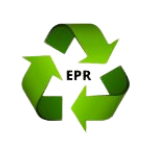 EPR Authorization
EPR AuthorizationFor P-Waste Products
Extended Producer Responsibility (EPR) Authorization for P-Waste, which stands for Packaging Waste, is a regulatory framework designed to shift the responsibility for managing packaging waste from end consumers and local governments to the manufacturers, importers and brand owners of packaged products. It places the onus on these entities to take environmental responsibility for the entire life cycle of their packaging materials, from production to recycling or disposal.
Under EPR Authorization for P-Waste, manufacturers in the packaging industry are required to establish and fund systems for collecting, recycling and disposing of packaging waste in an environmentally responsible manner. This approach is intended to encourage the reduction of packaging waste and promote sustainable practices in packaging design and materials selection.
EPR Authorization programs for P-Waste typically involve collaboration between government agencies, industry associations and relevant stakeholders to define clear responsibilities, set recycling targets and monitor compliance. These programs aim to minimize the environmental impact of packaging waste, reduce landfill usage and conserve resources by encouraging the development of recycling infrastructure and sustainable packaging practices.
EPR registration certificate on the centralized EPR portal established by CPCB must be obtained by the following entities:
Registration of Manufacturers, Importers and Brand Owners via Plastic EPR Portal as per Plastic Waste Management Rules 2016
On February 16, 2022, the Ministry of Environment, Forest and Climate Change (MOEF&CC) introduced an amendment to the Plastic Waste Management Rules (Plastic Waste Management Amendment Rules). The amendment aims to enforce Extended Producer Responsibility, following the regulations and guidelines outlined in Schedule II. According to Clause 10.1 of the Guidelines, producers, importers, and brand owners (PIBOs) are required to adhere to the regulations and standards specified in Schedule II. Furthermore, Clause 10.2 stipulates that the Central Pollution Control Board (CPCB) will oversee the completion of the Standard Operating Procedure for registration and the action plan pro-forma. Pollution Inventory and Reporting Officers must obtain EPR registration from CPCB if they operate in more than two States/Union Territories, while other PIBOs should register with the relevant State Pollution Control Boards (SPCBs) or Pollution Control Committees (PCCs) as per the rules detailed in this document.
To comply with the amendment notification, the CPCB has initiated the development of a portal including the following modules:
Manufacturers falling under EPRA's purview are required to fulfil several significant responsibilities:
EPR Authorization for P-waste is important for manufacturers operating in the Indian market in several ways:
Brand Liaison specializes in guiding manufacturers through the EPR Registration process for P-waste. With our expertise, you can obtain the EPR Registration Certificate seamlessly.